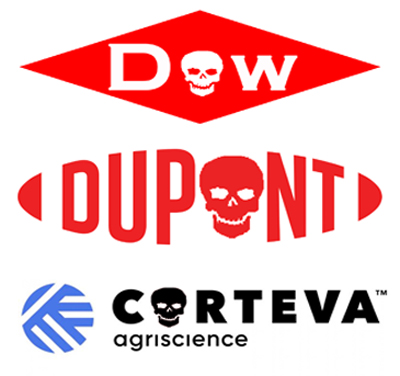
On 31 August, 2017, a merger was completed between the Dow Chemical Company and DuPont to form a single, gargantuan chemical corporation. It was, at that time, the world’s largest. Known as DowDuPont, it was worth an estimated $130billion.
From the outset, DowDuPont was designed to split into three new companies with the apparent agenda of consolidating the various assets and divisions of each company which had previously been in competition; an added bonus would seem to be adding complexity to the pursuit of outstanding liabilities belonging to either company.
Early in June this year, and DowDuPont completed the split, into three publicly-traded companies: an agriculture business known as Corteva Agriscience; a materials science business, Dow; and a ‘specialty products’ company DuPont. The concern for us, and potentially for stockholders of the new companies, is of where Union Carbide’s liabilities now lie and the Securities and Exchange Commission filings for the new Dow reveal that it expects to assume them. However, as has become the pattern in Dow’s previous SEC filings, Bhopal is not mentioned and only asbestos-related liabilities (in the US) are cited as being of material concern.
But, the plot seems to thicken since Union Carbide’ facilities in the US will become a part of the new DuPont i.e. Union Carbide is effectively spreading across, at least, these two new entities. This is especially problematic since Dow is a named respondent in the forthcoming ‘Curative petition’ in the Delhi Supreme Court, aiming to address the inadequacies of the 1989 civil settlement of the Bhopal Disaster, which is due for a hearing.
The curative petition aims to address what the Indian Government itself considers the ‘irremediable injustice’ of the original settlement and is seeking an additional settlement of between $1.5- 8.1billion dollars depending on which figures for dead and injured are utilised. So, what happens if respondent Dow ‘owns’ Union Carbide’s liabilities but its assets have been transferred to another corporate entity in the new DuPont?
Union carbide has been a 100% owned subsidiary of Dow Chemical since 2001 and, according to Baskut Tuncak the UN’s special rapporteur on hazardous substances and wastes: “This merger creates yet another layer of legal hurdles for victims to arrive at any semblance of an effective remedy and accountability for a preventable disaster now more than 30 years old.”
A legal opinion we received in 2017 stated: “ …the merger of Dow and DuPont may raise additional limited liability and separate legal personality doctrinal barriers, and that a proposed post-merger division of Dow-Dupont into three separate Spin-Off companies may create further complexity, leading to a dissipation and/or effective removal of assets required to be available to satisfy potential findings of liability against each defendant by this Court.”
BMA has been covering this story since the news of the merger broke. On our ‘Opinion and Debate’ page you can find out how we reported its development, by following the first link here.


